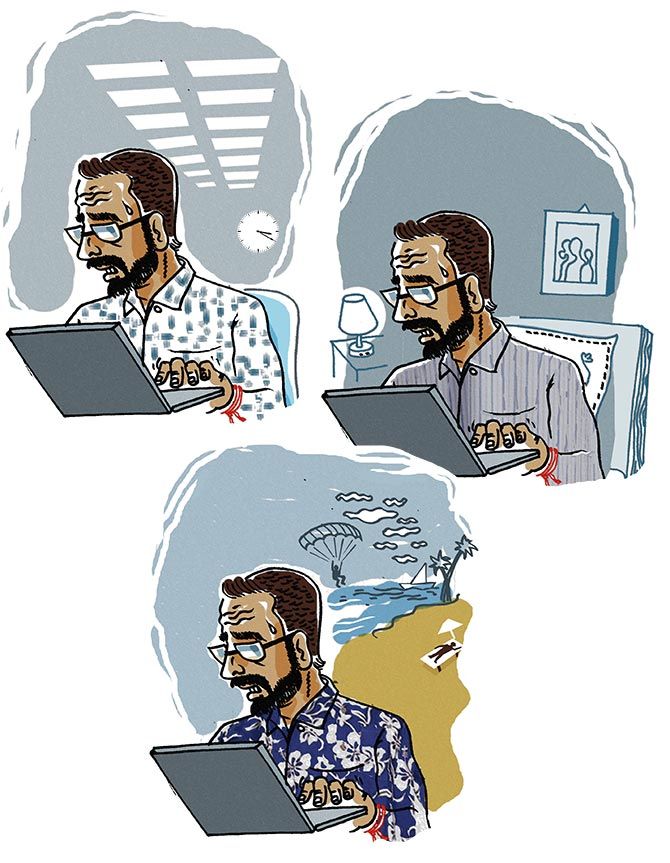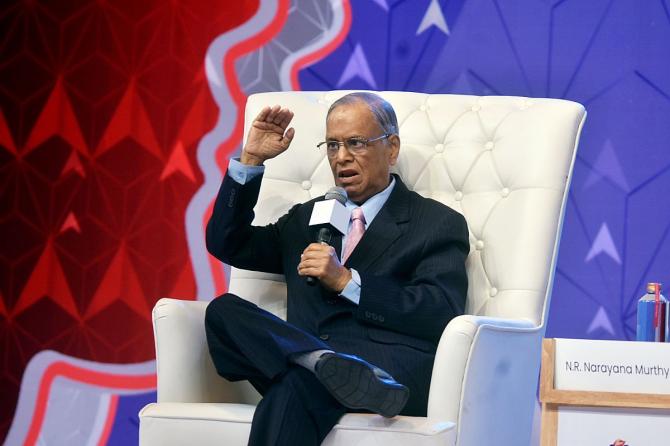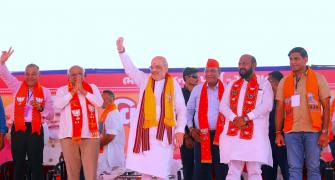There needs to be a fine balance, not a heartless robotic existence for our future generations, who are all accustomed to the western ways from their on-site life out there and end up losing whatever Indian character and characteristics that they have inherited and/or imbibed, suggests N Sathiya Moorthy.

Infosys's N R Narayana Murthy's recent advice for Indian youth to put in more hours of work per week could not have come at a wrong time for his son-in-law and British Prime Minister Rishi Sunak's English cricket team.
Taking one beating after another, the last one against hosts Indians, that too by a whopping 100 runs with 15-plus overs to spare in World Cup 2023, meme-creators told the IT guru to give his advice to the family, for his nation's cricketers, instead.
Others were uncharitable to suggest that employers like Murthy want more work from their employees for them to amass trillions, in the place of billions at present.
The apprehension among the IT sector youth is that Murthy's call is for the industry to increase their working hours through new contracts.
Alternatively, his was an appeal for the government to facilitate it under law.
Either way, they think that the suggestion is not for increasing productivity at their level (and that of the industry and the nation?).
To them, it is more about increasing profitability for the private sector by employing fewer people working longer hours.
As they point out, if Murthy had in mind ideas like 'higher pay for longer work', he did not spell it out.
The IT youth have a point. Already, they are cut off from the rest of society and family for reasons that most of them have not figured out.
Many of them do not even acknowledge that they are living in the stratosphere when most other Indians are living way below on terra firma.
Pre-Covid they were getting adjusted to working for two time-zones, one in India and the other in the country of their client's, especially the US.
Now after Covid lock-down and work-from-home, long hours on two time-zones has become the norm for them.
So is taking office work home. It used to be a rarity in the industry in particular.
This has meant that much of the waking hours of their children, if they get to see either or both parents when awake, the IT-ITES youth in particular spent inside their rooms with strict instructions for the rest of the family, young and old, to neither disturb them, nor make a noise.
It means others can whisper among themselves, not talk, and cannot watch evening TV soaps.
Delivery boys ringing the doorbell is a strict no-no. Infants have no right to cry.
During the Covid lockdown and since, behaviour therapists and family counsellors have been reportedly handling more cases, not less, as they had feared initially.
Most of them are couples under work pressure with the eternal pressure of overnight sacking increasing by the day.
It reflects on the family, the children are the worse sufferers, not that their parents are any better.

Murthy's 70-hour week norm translates as 10 hours a day all seven days, or 11.5 hours six days or 14 hours straight in a five-day week.
Hopefully, we are far away from a seven-day week. But either of the other two, especially 14 hours in a five-day week schedule, means that lunch-break and travel time to and from work, together consume anything from 18 to 20 hours a day, depending on which city and which part of the city you work and reside in.
The day has only 24 hours, and the man or woman will require the weekends to catch up on sleep, recoup and prepare physically and mentally, for a new week with the same monotonous routine.
From 'Thank God, it is Friday' to 'OMG, it is Monday', nothing changes.
Under Murthy's scheme, the scream on either end can only be more frequent and shriller.
Yes, it is all about the IT and allied sectors. But what is true of them is true of the rest of industry, where too 'outsourcing' for lower-end jobs is the order of the day.
It has replaced a less frequently used term, 'contract labour' from the past, where there was more protection for the workers, not less as at present.
At one level, you can blame it on the economic reforms, which coincided with the IT boom worldwide, when India was ready to take on more workload, starting with 'call-centres' and moving up the value-chain to software development, et al.
Today, Bengaluru is the Silicon Valley of India, yes, but unacknowledged there are many more across the country.
Together, they all have destroyed what the present-day rulers of the country especially celebrate as the 'Indian value system and lifestyle', where they repeatedly tell you how the family comes first.
It is the kind of nationalism that marries family values with national values.
They have picked up the family value system that in a way is unique to the country and is being practised by all across, cutting across caste, clan and communities that includes religion.
They have imposed their idea of national values and you have an exhilarating potion that is theirs, and is there for the whole nation to consume, imbibe or whatever.
Ironically, the very same government and political leadership that have based their politics on those very values have done nothing to protect them.
They can blame the post-reforms labour codes on their favourite punching bag, namely, the Congress-led Manmohan Singh government.
Finding his economic reforms not working for the vast majority of the country, Dr Singh, when he transited from finance minister to prime minister, talked about 'reforms with a human face'.

Yes, Dr Singh as prime minister re-introduced many of the subsidy schemes that he had withdrawn as finance minister when the nation's economy was at the cross-roads, transiting from the failed socialist order to the promising system of market economy. He even introduced new subsidies like the MGNREGA scheme.
Yet, on the work front, 'labour law reforms' that used to mean a pro-labour approach now came to mean what is often dubbed as a 'pro-employer' statute.
That has not changed under the self-styled desi government of the BJP-NDA, first under Atal Bihari Vajpayee for six years and now under N D Modi for nine-plus years, with the party hoping for a third consecutive term of five more years, beginning next year.
There is instant recognition that the new world order especially on the economic front, into which India has allowed itself to be sucked in, has destroyed core Indian values of yore.
The unique joint family system began breaking up when rural elite began migrating to urban centres for jobs even under the erstwhile British Raj.
That was also when conservative communities broke the tradition or taboo of not crossing the oceans to sign up in one of the four Inns of Court in the UK or prepare for the all-encompassing ICS examinations, before returning to home to serve the nation's alien masters at a rank more appropriate to their social standing back in their villages and clans.
Their grand and great grandchildren have continued the new tradition of studying in India to serve a foreign master, be it in the US or Europe, Australia or wherever – and blame it on lack of opportunities, the quota scheme, et al in this country. They know that is not the truth, the whole truth.
The fact is that middle class families especially bring up their children, both boys and girls, from LKG upwards with the sole aim of entering an IIT and then IIM, but only to fly away to 'greener pastures'.
It is the parental pressure that has been visiting on their children, and slowly but surely more of the latter class is walking out of the parental binding – and with that the family bonding, too.
Today, nuclear families have become the norm in urban India and in states with a higher degree of education, employment opportunities and industrialisation.
The higher lifestyle expenses flow from a re-prioritised money management, where credit card payments and EMIs take precedence over the old world Indian mindset of save before you spend or save-to-spend.
It translated as not pledging your unsure future on loan-repayments without the kind of job guarantees and fixed incomes that the more secure public sector jobs offered in the forgotten socialist era.
That was also the era when there were only public sector insurers, and your insurance agent and his development officer showed the same alacrity in settling the dues when the policy-holder passed away as they were in selling what is now known as one more ‘product' in emotionless industry parlance.

Emotions, alongside high philosophy made up Indian traditions and values, hence the overall Indian character and characteristics.
All of them began going through the window when economic reforms came in through the wide open doors.
Thus the otherwise heartless post-Independence 'socialist' scheme provided for more annual holidays across the board and also French leave on a daily basis.
They were all meant for the employee to attend to his social and family commitments, starting with preparatory work relating to the marriage of a sister or daughter, or education of a brother or son -- and in that order -- or a community festival in the family village.
None of it can be re-invented now, but there should be a socio-administrative discourse on shoring up whatever remains of a hoary past – whether to retain them and build on them, or let them too go off.
Already, in this consumerist society of what it is today, you have your parents who have spent their life's earnings on your education and well-being spending their closing years unemotionally in a senior citizen's home -- that is if they or you can pay for their upkeep.
Lower the socio-economic status, greater are the chances that the parents get the boot, to eke out a living in a distant town, as round-the-clock security guard or house maid.
It is the new norm that the nation is getting adjusted to, but it is here even the State that swears by Indian values -- call it Bharatiya Sanskar, if you want -- but has not taken over the job of old-age upkeep in any which way.
If anything, the government has only withdrawn or is persuading the oldies to give up their travel concessions by air and rail, and in the name of a unique brand of nation-building that is supposedly wedded to values.
There are also no provisions for insuring oneself after 70 years, when the mortality age has been going up and up, thanks to better medical care from the socialist era onwards.
Life-long pension schemes in the government sector replacing fixed years' schemes, and with none still for those in the private sector.
Slowly but surely, the son of a semi-literate postal peon drawing a decent salary and pension in his time, for instance, has been pushed to spend his life as a food delivery boy or as one for a neighbourhood courier franchise, for a pay whose real value is much than it was in his father's time.
That whole class of people, whom independent India strived to pull out of the rut of generations and centuries, are being carefully and cautiously pushed back into where ‘they should always belong'.

This is what happened in the developed West, which is what is happening in the fast-developing India, too. And what they achieved over two centuries, post-reforms India has managed in just two fast-tracked decades.
Sooner or later, there could be national cost to pay, as at present, the leadership's obsession is with a GDP-linked growth, where India is edging out one more country by the year -- yet, possibly never reach the top slot, when alone it can tell the world what to do and how to do it, too.
All of it comes at a time when Narayana Murthy's wife, Sudha Murty, has been talking and writing eloquently about the greater Indianness and her house-wifely duties that too went into the making of Infosys in its formative years, like many woman IT professionals have pointed out in their response to her husband's idea of longer working hours.
They have also pointed out that even at present they end up doing double duty, both on the work and home fronts.
It is another matter that the IT guru's hard-working son-in-law is never ever tired of displaying his Indianness in public, that too in a nation where prejudices of the kind still rule politics and elections....
There thus needs to be a fine balance, not a heartless robotic existence for our future generations, who are all accustomed to the Western ways from their on-site life out there and end up losing whatever Indian character and characteristics that they have inherited and/or imbibed.
Any questions?
N Sathiya Moorthy, veteran journalist and author, is a Chennai-based policy analyst and political commentator.
Feature Presentation: Rajesh Alva/Rediff.com








